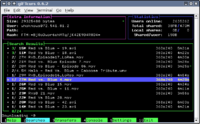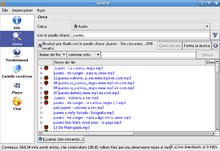giFT
| Developer(s) | jasta |
|---|---|
| Initial release | 2003 |
| Stable release | 0.11.8.1[1] |
| Preview release | No |
| Written in | C |
| Platform | Cross-platform |
| Available in | English |
| Type | Peer-to-peer |
| License | GNU GPL |
| Website | sourceforge |
giFT Internet File Transfer (giFT) is a computer software daemon that allows several file sharing protocols to be used with a simple client having a graphical user interface (GUI). The client dynamically loads plugins implementing the protocols, as they are required.[citation needed]
General

Clients implementing frontends for the giFT daemon communicate with its process using a lightweight network protocol. This allows the networking protocol code to be completely abstracted from the user interface. The giFT daemon is written using relatively cross-platform C code, which means that it can be compiled for and executed on a big variety of operating systems. There are several giFT GUI front-ends for Microsoft Windows, Apple Macintosh, and Unix-like operating systems.[citation needed]
The name giFT (giFT Internet File Transfer) is a so-called recursive acronym, which means that it refers to itself in the expression for which it stands.
One of the biggest drawbacks of the giFT engine is that it currently lacks Unicode support, which prevents sharing files with Unicode characters in their file names (such as "ø","ä", "å", "é" etc.).[citation needed] Also, giFT lacks many features needed to use the gnutella network effectively.
Available plugins
Available protocols are:[2]
Stable
OpenFT protocol

giFT's sibling project is OpenFT, a peer-to-peer file-sharing network protocol that has a structure in which nodes are divided into 'search' nodes and 'index' supernodes in addition to common nodes. Since both projects are related very closely, when one says 'OpenFT', one can mean either one of two different things: the OpenFT protocol, or the implementation in the form of a plugin for giFT.
Although the name OpenFT stands for "Open FastTrack", the OpenFT protocol is an entirely new protocol design: only a few ideas in the OpenFT protocol are drawn from what little was known about the FastTrack protocol at the time OpenFT was designed.[citation needed]
OpenFT file-sharing protocol
Like FastTrack and Napster, OpenFT is a network where nodes submit lists of shared files to other nodes to keep track of which files are available on the network. This reduces the bandwidth consumed from search requests at the price of additional memory and processing power on the nodes that store that information. The transmission of shared lists is not fully recursive: a node will only transmit its list of shared files to a single search node randomly chosen as that node's "parent", and the list of those files will not be further transmitted to other nodes.[4]
OpenFT is also similar to the gnutella network in that search requests are recursively forwarded in between the nodes that keep track of the shared files.
There are three different kinds of nodes on the OpenFT network:
- USER
- Most nodes are USER nodes; these have no special function.
- SEARCH
- These nodes handle search requests; they search the filelists their CHILD nodes (explained below) submit to them. These nodes must have a capable Internet connection and at least 128M RAM. A modern processor is highly recommended as well.[5]
- INDEX
- Nodes with fast connections and much memory can be INDEX nodes, which keep lists of available search nodes, collect statistics, and try to maintain the structure of the network.[6]
A node can be both a SEARCH and an INDEX node. USER nodes will pick three SEARCH nodes to be their PARENT nodes. They will submit their shares list to them if the PARENT accepts the USER as its CHILD. By default, SEARCH nodes will be PARENTS for a maximum of 500 CHILD nodes.
giFT front-ends
| Name | Platform | License | Features | Latest version | Website |
|---|---|---|---|---|---|
| giFTcurs[7] | Unix-like | GPL |
|
0.6.2 | |
| Apollon[8][9] | Unix-like/KDE | GPL |
|
1.0.2.1 (2005-05-08) | apollon.sourceforge.net |
| KCeasy[10][11][12] | Microsoft Windows | GPL[13] |
|
0.19-rc1 (2008-02-03) | KCeasy Source Forge website |
| giFTwin32[12] | Microsoft Windows |
|
|||
| Poisoned[14][15] | Mac OS X | GPL |
|
0.5191 (2006-08-08) | www.gottsilla.net |
See also
- MLDonkey - another plugin based multi-network P2P client
References
- ^ https://sourceforge.net/projects/gift/files/gift/0.11.8.1/. Retrieved 7 September 2019.
{{cite web}}: Missing or empty|title=(help) - ^ "GiFT: Network Plugins". Archived from the original on 2007-02-16. Retrieved 2007-02-15.
- ^ "giFT: Internet File Transfer". 2002-05-11. Archived from the original on 2011-09-27. Retrieved 2010-01-04.
- ^ From the giFT documentation at the giFT homepage
- ^ According to the giFT documentation:
Search nodes handle search requests. They search the filelists their CHILD (common) nodes submitted to them. These nodes must have a capable Internet connection and at least 128M RAM. A modern processor is highly recommended as well.
- ^ According to the giFT documentation:
INDEX nodes keep lists of available search nodes, collect statistics, and try to maintain the structure of the network.
- ^ Scott Rippee (15 Jan 2004) Throw That GUI Out the Door: Console Applications That Shine, OSNews
- ^ Juergen Haas, Appolon Archived 2011-07-07 at the Wayback Machine, About.com Kubuntu Guide
- ^ Carsten Schnober, Olympian Exchange. File Sharing with Apollon and GiFT Archived 2008-11-21 at the Wayback Machine, Linux Magazine issue 55, June 2005, pp. 82-83
- ^ Thomas Mennecke (September 5, 2004) Getting Into KCeasy Archived 2012-02-20 at the Wayback Machine, Slyck.com
- ^ KCEasy Review FileSharingZ.com
- ^ a b "Slyck News - Slyck's Interview with KCeasy". www.slyck.com. Archived from the original on 2010-01-03. Retrieved 2010-02-16.
- ^ "KCeasy". SourceForge. 8 April 2013.
- ^ John Borland, Macintosh users join Kazaa network, CNET News, November 19, 2003
- ^ Thomas Mennecke, Poisoned: Bringing FastTrack to the Macintosh Community Archived 2012-02-20 at the Wayback Machine, November 21, 2003
- Marcus Bergner, FastTrack chapter in his MS Thesis "Improving Performance of Modern Peer-to-peer Services", 10 June 2003, Umeå University, chapter "discusses the FastTrack protocol used by the KaZaA family of file sharing applications. Since the protocol is a well kept secret most discussions will relate to the giFT project, an open source implementation attempting to provide similar capabilities."
- Choon Hoong Ding; Sarana Nutanong; Rajkumar Buyya (2005). "Peer-to-Peer Networks for Content Sharing". In Subramanian, Ramesh; Goodman, Brian D. (eds.). Peer-to-peer computing: the evolution of a disruptive technology. Idea Group. pp. 58–61. CiteSeerX 10.1.1.70.3712. ISBN 1-59140-430-4.
- "Introduction to giFT - internet File Transfer". 2007-01-06. Retrieved 2010-01-04.
Further reading
- Minaxi Gupta, Markus Jakobsson, Andrew Kalafut, and Sid Stamm, Crimeware and Peer-to-Peer Networks, chapter 3 in Markus Jakobsson, Zulfikar Ramzan, Crimeware: understanding new attacks and defenses, Addison-Wesley, 2008, ISBN 0-321-50195-0, pp. 55–76 (discuses malware in the OpenFT and Limewire networks)
- based on: Kalafut, Andrew; Acharya, Abhinav; Gupta, Minaxi (2006). "A study of malware in peer-to-peer networks". Proceedings of the 6th ACM SIGCOMM on Internet measurement. IMC'06. pp. 327–332. CiteSeerX 10.1.1.70.3712. doi:10.1145/1177080.1177124. ISBN 1-59593-561-4.
